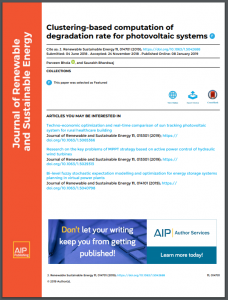Full Title: Clustering-based computation of degradation rate for photovoltaic systems
Author(s): Parveen Bhola and Saurabh Bhardwaj
Publisher(s): Journal of Renewable and Sustainable Energy
Publication Date: January 1, 2019
Full Text: Download Resource
Description (excerpt):
For effective utilization of solar energy, performance monitoring of photovoltaic (PV) systems is required. Two important research goals are to maximize the power output from PV systems and further reduce the economic losses. This paper proposes a model using a clustering-based technique to evaluate the degradation of PV panels with different topologies. Here, the performance ratio (PR) of the PV panels is estimated without physical inspection on-site, making the proposed model beneficial for real-time estimation of the PR and in turn for more robust forecasting of the PV power output. The present work utilizes the segmental K-means clustering technique to obtain clusters of input meteorological data sharing similar features. Various forms of meteorological data, including temperature, relative humidity, wind speed, dew point, solar radiation, and sunshine hours, are given as the input, and solar power data are the output of the proposed model. The proposed model calculates the degradation in output solar power in terms of PR for panels with three different topologies, namely, amorphous silicon (a-Si), polycrystalline silicon (p-Si), and hetero-junction with an intrinsic thin layer (HIT), over a period of three years. The degradation rate produced by a-Si technology was lowest, and it was highest for HIT technology. The results obtained showed good agreement with the standard method used for performance evaluation in a similar earlier study. The proposed model has the advantage over other methods that real-time estimation is possible, as this method does not require physical inspection and imaging, which is essential in other techniques.
